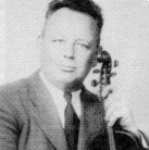IPA Hall of Fame Categories
Categories:
IPA Hall of Fame Biography
Jan Robak was born in Poland on December 1, 1890, and passed away on September 8, 1967. He came to this country and Chicopee, Massachusetts with his violin at the age of ten. He started to play the violin in Poland and continued his study of violin and music after coming to this country.
His first job in Chicopee was at the Johnson and Johnson Textile Mill. As he grew older he formed a band that played just about every Polish wedding in the vicinity which, incidentally, lasted for three days. The day before the wedding was known as "do welona" [the veil] and the next day was known as "poprawiny."
Jan married Julia Rusin on May 8, 1917, and had two sons, Fred and Frank. As they grew up they became musicians - Fred playing the clarinet and Frank playing the trumpet.
By the 1930s he joined up with Walter Fronc to form the Robak and Fronc Orchestra. The orchestra consisted of Jan on lead violin, rhythm violin, (Walter Fronc), bass viol, and clarinet or flute. If you listen to their early recordings you will notice the absence of certain instruments such as the accordion, drums and piano on the recordings. However as the years passed, a trumpet, accordion and piano were added to the arrangements.
The Robak and Fronc Orchestra recorded for Columbia and RCA Victor in the early 1930s. The original recording contract was with Columbia records, but because the band was so popular they also signed on with RCA. Back then an orchestra was not allowed to record with another company because of their recording contract. In order to get around this they changed their name. This is why you might see the Robak and Fronc on Columbia and Jan Robak Orchestra or Walter Fronc Orchestra on RCA.
One of their first recordings, "Pytala Sie Pani" ["I Asked Miss"], turned out to be a tremendous success. Incidentally, this recording also became the first Polish recording to be pressed as a 45 rpm record for the new juke boxes that were just coming into vogue. And there was a need for some good Polish records for these new juke boxes.
The Robak and Fronc Orchestra played all over the eastern seaboard in many different states. They were one of the first traveling and recording orchestras in the New England area. How the traveling came about is an interesting story.
Stanley Kapinos, the trumpet player, was a funeral director and had owned a limousine for his business. This limo turned out to be perfect for the bands' road jobs because it was large enough to carry the musicians and their equipment. The cars in those days did not have trunks but rather luggage racks. All the instruments were placed on the racks except for the bass viol, which was placed inside.
The Jan Robak Orchestra was also the first to play live over the radio. They played their first Polish radio show from WMAS radio in Springfield, Massachusetts about 1935. The program founder was Jan Kosko, and this became a weekly broadcast that continued for years. The band also had the honor of playing for the grand opening of the Windsor Locks Polish Home fifty years ago. Then there was also a long-playing engagement at the Enfield Polish Home where the band packed the crowd in each and every Sunday for fifteen years.
Most of the music recorded by the Robak & Fronc Orchestra was original and was penned by the leader, Jan Robak. All the music was also copyrighted. While we don't have a complete list of his many recordings, it's safe to say he recorded at least fifty or more recordings for RCA Victor and Columbia records. The most popular was "Pytala Sie Pani" for which he received royalties for years. "Panie Majster Polka" ["Mr. Foreman Polka"] was another one of his songs that has been recorded by different bands including Eddie Blazonczyk and the Versatones. Often tunes such as this could be found with variations in titles and word changes but the tune remains.
Jan was best friends with a younger musician by the name of Joe Lazarz. In fact, he showed him a number of things on the violin. He helped Joe with the fingering for a neat little tune called the "Pizzicato Polka" that later went on to become a big hit for the Joe Lazarz Orchestra of Indian Orchard, Massachusetts.
Jan Robak retired his band in 1960 and then went on to play violin and clarinet with area musicians. Actually, he never retired from playing. He continued playing polka music until his death in 1967. Jan Robak was inducted into the Polka Music Hall of Fame in the Deceased Category.




